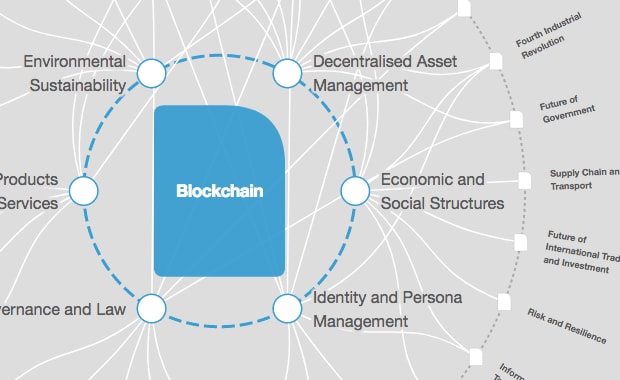How to build a successful nationwide blockchain initiative

A blockchain network provides a distributed ledger to applications. Image: Clint Adair/Unsplash

Get involved with our crowdsourced digital platform to deliver impact at scale
Stay up to date:
Blockchain
- Blockchain technology should not be a goal in itself but a tool deployed to achieve specific purposes.
- Ensuring interoperability with other trade networks is a key technical challenge.
- The governance structure and revenue/benefits allocation must incentivize all players.
- The main challenges to blockchain deployment are tied to operational and regulatory questions, rather than technical factors.
National initiatives to build networks across organizations have been a challenge since the start of the digital era. A business network typically consists of groups of companies from multiple different organizations with separate ownership, but with similar business needs and problems.
The evolution of blockchain and distributed ledger technology has encouraged such ecosystem collaboration and the formation of blockchain networks at a country level. A blockchain network is an infrastructure that provides a distributed ledger to applications and comprises of nodes. These nodes are operated by organizations that maintain the state of the network and a copy of the ledger.
Nadia Hewett, Blockchain and Distributed Ledger Technology lead for a trade-related project at the World Economic Forum, says: “The distributed nature of blockchain technology makes it arguably the ultimate networked technology. Even more so than with other emerging technologies, blockchain applications are premised on networked and peer-to-peer engagement around shared distributed ledgers. With the advance of blockchain technology, many government entities globally have kicked-off pan-nation initiatives, including setting up a national trade network.”
One such example is the United Arab Emirates government. In April 2018, the UAE government launched the Emirates Blockchain strategy 2021 to transform 50% of government transactions onto blockchain-based platforms. Working with the World Economic Forum, the Centre for the Fourth Industrial Revolution UAE has convened organizations across the public and private sector to share successes, learnings and best practices on blockchain deployment.
Tapping into these lessons, and as part of a UAE National Trade Platform initiative, we have gathered some experiences from a number of organizations on what makes for successful blockchain deployment.

1. Business viability
The uncertainty over whether blockchain technology is the most appropriate tool and the return-on-investment of this nascent technology have been restricting many efforts to move past proof-of-concept (POC) stage to full-scale production. For any organization, blockchain technology should not be a goal in itself but a tool deployed to achieve specific purposes.
Learning challenges primarily revolve around identifying the right applications of blockchain and ensuring proper education and awareness for the stakeholders involved, the Smart Dubai Government approached blockchain solutions accordingly. Smart Dubai Government opened up business opportunities in the government, in parallel with companies experimenting with nascent technologies such as blockchain. Initiatives such as DFF (Dubai Future Foundation) provide gateways for their deployment in the real world, once Lab Projects/POC/Pilots are proven both technically, operationally and with a solid business case around return on investment (ROI) and return on value (ROV) aspects.
2. Technical feasibility
A key technical challenge during blockchain deployment is ensuring interoperability with other trade networks (locally and internationally). Addressing this challenge, it is key to follow established data standards, and for the governments to establish interoperable digital identity verifiers for businesses and citizens. With the Dubai blockchain strategy in place and aiming to become a blockchain-enabled city by 2020, a proactive approach to interoperability was necessary. Key blockchain projects collaborated to align and builD on similar technologies to future-proof for interoperability within the UAE, and with networks outside the UAE.
3. User desirability
Small and medium-sized enterprises (SMEs) are key participants of trade platforms. With larger organizations driving the development of such industry and country-wide blockchain solutions, there is limited understanding of the challenges that are faced by SMEs. In response, it is critical to follow a user-centric design process. Organizations and people for whom the solution is designed are experts in their problems. So, it is imperative to involve SMEs to design a solution that addresses the various facets and complexities of the challenge at hand. In the UAE, establishing user-group forums were one way to achieve this.
An example is DP World – a logistics company operating ports and logistic activities. They recently launched a blockchain platform that aims to unify trader registration for its free zone customers and digitize export/import-related documentation and processes. In developing the solution, user desirability was a primary focus, by aiming to enhance user experience for DP World’s traders.
4. Ecosystem achievability
The adoption of all required stakeholders to join a nationwide or similar network will be a major challenge. Maintaining close communication and positive relationships with engaged stakeholders is key. The governance structure and revenue/benefits allocation must incentivize all players and a clear roadmap will help with ecosystem expansion.
It has been well understood by the emerging blockchain consortia in UAE that the features of blockchain cannot be unlocked in isolation. Henceforth, while looking at various private as well as government UAE initiatives, many are executed and implemented through strategic business associations (for instance as a consortium), consisting of a champion, independent regulators and participants who are both consuming and contributing to information being shared on the blockchain.
How is the World Economic Forum promoting the responsible use of blockchain?
In general, in the UAE, we have learned that the main challenges to blockchain deployment remain tied to operational and regulatory questions, as opposed to technical factors. For the UAE, resolving some of the main challenges has come from the government playing a big role in embracing emerging technologies and emphasizing the value of innovation for advancing society, supporting both the private and public sectors in exploring, implementing and scaling new technologies.
To learn more real-world insights from the UAE blockchain ecosystem, the white paper Inclusive deployment of blockchain: case studies and learnings from the United Arab Emirates, published by the World Economic Forum, provides a detailed analysis of case studies and insights from over 100 stakeholders from more than 60 governmental and non-governmental entities.
Don't miss any update on this topic
Create a free account and access your personalized content collection with our latest publications and analyses.
License and Republishing
World Economic Forum articles may be republished in accordance with the Creative Commons Attribution-NonCommercial-NoDerivatives 4.0 International Public License, and in accordance with our Terms of Use.
The views expressed in this article are those of the author alone and not the World Economic Forum.
The Agenda Weekly
A weekly update of the most important issues driving the global agenda
You can unsubscribe at any time using the link in our emails. For more details, review our privacy policy.
More on Emerging TechnologiesSee all
Ella Yutong Lin and Kate Whiting
April 23, 2024
Andre S. Yoon and Kyoung Yeon Kim
April 23, 2024
Simon Torkington
April 23, 2024
Thong Nguyen
April 23, 2024
Kalin Anev Janse and José Parra Moyano
April 22, 2024
Sebastian Buckup
April 19, 2024






